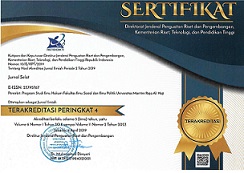Kedaulatan Rakyat di Indonesia: Konsep Yang Dianut Dan Konsekuensinya di Dalam Pembentukan Peraturan Perundang-Undangan
DOI:
https://doi.org/10.31629/selat.v10i2.5456Keywords:
People's Sovereignty, Legislation, ReligionAbstract
One of concepts of sovereignty or the highest power adopted by the 1945 Constitution of the Republic of Indonesia is the concept of people's sovereignty. This is found in Article 1 paragraph (2) of the 1945 Constitution of the Republic of Indonesia. As a concept that originates from outside, of course this concept receives diverse views from various groups. This is understandable because any concept is definitely not value-free. It is influenced by various factors such as religion, ideology, politics, history, and so on. Besides that, ethnicity as a concept in the life of the state, of course influences other fields, including in the formation of laws and regulations. Therefore, the purpose of this research is to find out the concept of people's wealth which is adhered to by the 1945 Constitution of the Republic of Indonesia. In addition, this research is also intended to develop the concept of ethnicity which is adhered to in the formation of laws and regulations in Indonesia. The result of the research is that the People's Sovereignty adhered to by the 1945 Constitution of the Republic of Indonesia is limited by the power of God. This is different from the concept of the original version of the people's area. Where the people's choice is absolutely in the hands of the people. This departs from the understanding of a country that is neutral from religion. Meanwhile, the consequence of the concept of ethnicity that is adhered to in the formation of laws and regulations is that each formation of statutory regulations is limited by the provisions of God Almighty. So that deliberations or voting can be carried out when there is no explicit regulation by the provisions of the Law of God Almighty.
References
A. Buku
Al-Qur’an al-Karim.
Adian Husaini, 2015, Mewujudkan Indonesia Adil dan Beradab, Surabaya: Bina Qalam Indonesia.
Alaidin Koto, Islam, Indonesia dan Kepemimpinan Nasional, (Jakarta, PT. Ciputat Press, 2009).
Dyah Ochtorina Susanti dan A’an Efendi, (Penelitian Hukum (Legal Research)). (Jakarta, Sinar Grafika, 2013).
Hazairin, Demokrasi Pancasila, (Jakarta, Rineka Cipta, 1990).
Jeje Zaenudin, Politik Hukum Islam, Konsep, Teori, dan Praktik di Indonesia, (Jakarta, CV. Mega Rancage Press dan Persis Prers, 2019).
Jimly Asshiddiqie, Gagasan Kedaulatan Rakyat Dalam Konstitusi dan Pelaksanaannya di Indonesia (Jakarta, Ichtiar Van Hoeve, 1994).
Jimly Asshiddiqie, Pokok-Pokok Hukum Tata Negara Indonesia (Jakarta, PT Bhuana Ilmu Populer, 2008).
Jimly Asshiddiqie, Penguatan Sistem Pemerintahan dan Peradilan, (Jakarta, Sinar Garfika, 2015).
M. Natsir, Agama dan Negara dalam Perspektif Islam, (Jakarta, Media Da’wah, 2001).
Peter Mahmud Marzuki, Penelitian Hukum, (Jakarta, Kencana Prenada Media Group, 2005).
Rapung Samuddin, Fiqih Demokrasi, Menguak Kekeliruan Pandangan Haramnya Umat Terlibat Pemilu dan Politik, (Jakarta, Gozian Press, 2013).
Tohir Bawazir, Jalan Tengah Demokrasi, antara Fundamentalisme dan Sekulerisme, (Jakarta: Pustaka Al-Kautsar, 2015).
Yudha Pedyanto, Buanglah Demokrasi Pada Tempatnya, Menyingkap Kejahatan Demokrasi dan Bagaimana Mencegahnya, (Yogyakarta, Irtikaz, 2014).
B. Jurnal
Azmi, Kedaulatan Rakyat dalam Perspektif Negara Hukum Yang Berketuhanan, Alqalam, Vol. 35, No. 1, Juni 2018.
Mexsasai Indra, Konsepsi Kedaulatan Rakyat Dalam Cita Negara Hukum Pancasila, Jurnal Selat, Tanjung Pinang, Vol. 1, No. 2, Mei 2014.
C. Peraturan Perundang-Undangan
Undang-Undang Dasar Negara Republik Indonesia Tahun 1945.
Undang-Undang Nomor 12 Tahun 2011 Tentang Pembentukan Peraturan Perundang-Undangan.
Downloads
Published
How to Cite
Issue
Section
License
Copyright (c) 2023 Jurnal Selat

This work is licensed under a Creative Commons Attribution-NonCommercial-ShareAlike 4.0 International License.






